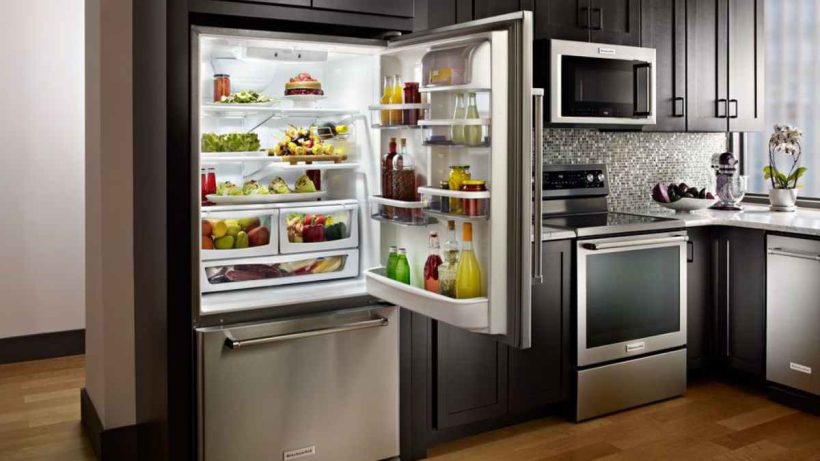Refrigerators keep fruits, vegetables, meat and dairy fresh and nutritious by keeping the temperature controlled environment clean and safe from insect attacks. They also serve to safeguard food against theft by protecting it against spoilage.
Prior to refrigeration, food would often spoil and become inedible before becoming safe for consumption. Extending this safe consumption period benefits both your budget and environment.
Manufacturers require raw materials, energy, labor, and technology in order to produce refrigerators. Furthermore, they need transport them to distributors, retailers and customers. For choosing the best brands, CHS wrote a blog post you can read.
Keeps Food Fresh
Refrigerators may be relatively new inventions, but people have long used cooler temperatures to store food at lower temperatures in order to delay spoilage by bacteria. Refrigeration was only recently developed; prior to mechanical refrigeration being invented people used ice and snow as cooling methods in order to preserve its texture, color, and nutritional value.
Refrigerators feature special drawers designed to mimic the conditions under which fruits and vegetables flourish. Many of these drawers come equipped with adjustable vents that help you find an optimum humidity and temperature combination for each food type stored there; for instance, closing off vents on thin-skinned vegetables stored in crispers may make them last longer than leaving them open.
Refrigerators can be costly to manufacture as they require raw materials, energy consumption, labor expenses and transportation fees; but their worth more than meets the eye as they reduce grocery trips per week as well as prevent food waste due to spoilage or decaying foods.
Saves You Money
Refrigerators save consumers money by allowing them to buy in bulk when food items go on sale and store leftovers quickly for quick consumption. Refrigerators also help reduce food waste by slowing the deterioration of perishable foods as well as spoilage and mold growth, saving time, effort, money and hassle in wasteful disposal methods.
Refrigeration is one of the biggest electricity drains in any household and may account for half or even all of your total household energy consumption costs. Switching to an energy-efficient model could significantly lower these expenses.
Look for appliances with the ENERGY STAR badge to indicate they meet energy-saving guidelines and comply with energy-saving practices. Newer refrigerator models use up to 15% less energy than older models; aim to set your fridge’s temperature optimally between cold and warm settings – keeping coils clean can improve airflow for efficient cooling as well. Make sure it’s placed away from heat sources such as radiators and cookers so as to limit how hard it has to work at maintaining coolness.
Saves You Time
Refrigerators consume significant amounts of electricity, accounting for roughly 10% of an average household’s electric bill and becoming one of the highest energy consumers within their home.
Thanks to collaboration between manufacturers and advocates, refrigerators have come a long way since their high-priced, energy-wasting predecessors. Today’s best models use 50% less power than their predecessors.
An energy-efficient refrigerator will save money and reduce food waste, but if that is out of your price range there are simple ways you can boost its energy efficiency with existing ones.
Maintain your fridge’s cleanliness and order; an efficient fridge uses less energy by being properly organised. Avoid placing it near heat sources such as ovens or dishwashers, as well as sunny spots which force it to run more often. Vacuum the coils regularly, replace filters as necessary, and remember to adjust its temperature settings regularly; too-cold temperatures waste energy while too-warm temps can increase electricity use by 30% or more!
Prevents Food Waste
Food waste has an immense effect on both the financial and environmental costs associated with our food systems. Each year in Europe alone, households discard about 155 million tons of edible products that could have been consumed – which generates approximately 3.3 billion tons of greenhouse gases (Kemna et al. 2017).
Refrigerators play a critical role in helping consumers prevent food waste by providing optimal storage conditions for longer. When it comes to fresh produce, it is best to adhere to the “first in, first out” principle so more recently purchased items are used first and this helps avoid forgetting or misplacing items and prevents food waste caused by neglectful behavior or mistakes in storage.
Refrigerators were seen by interviewees as critical agents in shaping moral narratives around food waste, serving both as concrete spaces for waste to occur and material points of discussion about wider social patterns, norms, and ethical dilemmas related to food consumption.
Laila Azzahra is a professional writer and blogger that loves to write about technology, business, entertainment, science, and health.
